The Uncut Humanity of Bali
The beauty of Tiyanar has always stayed with me. It’s been years since I was last there, but I am still envious of that version of myself that lived there for two months; that rode through hills and valleys on a motorbike, and got to put a smile on a lot of people’s faces, whilst learning so much about the kindness which comes with living in poverty on a daily basis.
The 15-minute journey to where I worked always stood out as one of the highlights for some reason. I was always excited, thinking about the class plans and what I could do in my allotted time for the students. I learnt early on, that there is a lot a child’s simplicity and humour can teach you. Imran (one of my best friends) and I wound up in a small Balinese village working for an organisation called Yayasan Widya Sari, which provides education to underprivileged and orphaned kids.
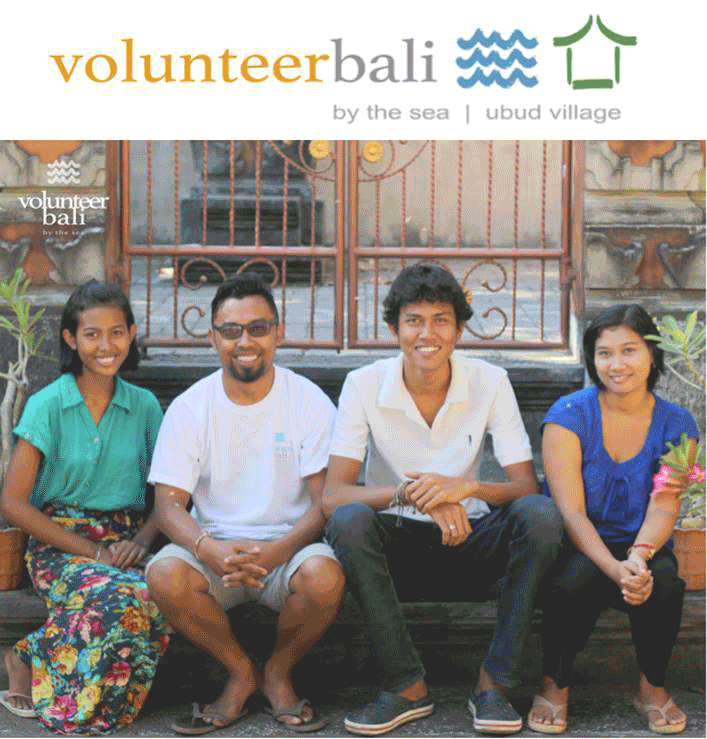
Julia, Ketut, Nyoman and Ni Putu Novia
The deal was simple. We work and teach Monday to Thursday, get accommodation and food – but no pay – and get all of Friday to Sunday off. Over a two-month period, we met a number of other volunteers from all over the world, a lot of whom found this gig out of convenience. We weren’t in a big town or city, but we were still in Bali, so within three hours one could get pretty much anywhere on the island. It was ideal for those who wanted to travel on a budget. Most of the volunteers would wait until the final class on Thursday, be gone until late Sunday night, and come back just waiting until Thursday again.
Yes, we took the weekends off to explore the island of Bali but there was never a strong desire to leave Tiyanar. Most of the volunteers stayed on ‘campus,’ run by a man called Ketut. Like most Balinese family homes, he had his own compound, a big house for his joint family to live in, another house built for volunteers to stay in and different structures dotted around a small playing field that were used as class rooms. As we had arrived during the summer, the volunteer house was full. Imran and I got the short end of the stick and ended up staying in a villa with two other volunteers; Lucie and Virtu.
But this villa was beautiful. Two bedrooms and bathrooms built indoors with a kitchen and a lounge outside, because the weather was almost always ideal. The swimming pool was a great addition but the views; if I opened my front door, the first thing in sight was the sea, on a part of the coastline that would only be used by a handful of local fisherman. But what I would look at every day when drinking my morning coffee, on the other side of the house, was Mount Agung: the biggest volcano in Bali.
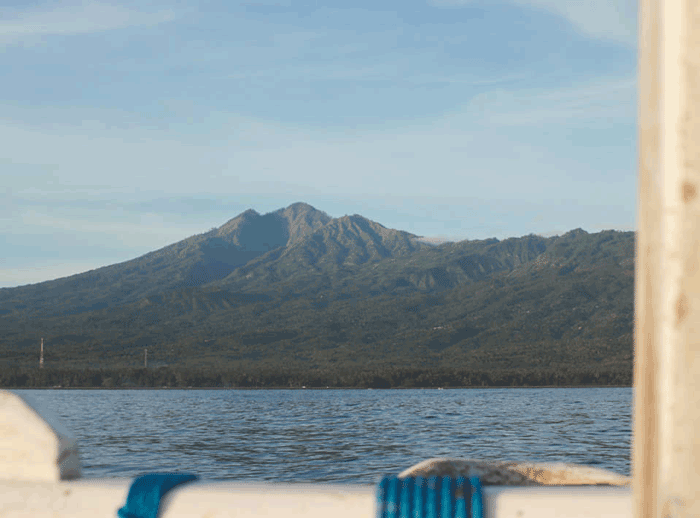
Mount Agung
The weather was perfect. The sun was never too strong, the heat was never too much. There was always a slight breeze, and you would always get the odd rain shower to give you that variety. All this made Tiyanar special, but the interactions we had with the people was what made Imran and I want to stay there every weekend. After class, we would stay until late at night, playing football and basketball with the students – having dinner with Ketut and Putukawi’s families’, listening to their musical talents on the guitar and actually getting to know them. The writing was on the wall from the second day that our bond with the locals would be strong.
Up until that point, neither of us (Imran and I) had really driven a motorbike before. However, prior to landing in Bali, we had spent months doing farm work in Australia. We would start our days in the freezing cold, and work until the sun was so hot that we couldn’t even rest on a rock if we didn’t want it to leave its mark. We chopped down trees, working for – and alongside – cowboy Australians; people whose only response to a fall, a cut, a broken bone was: “rub some dirt in it mate.” We had just come from a tough lifestyle and mentality, and a motorbike wasn’t going to put us down.
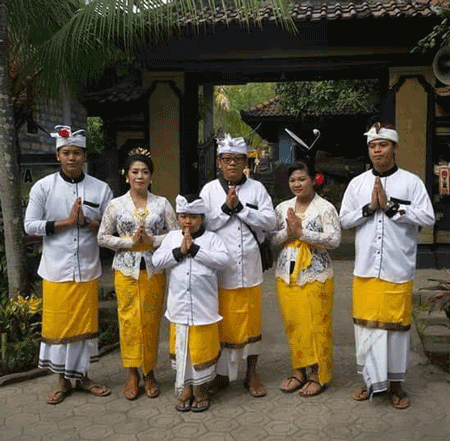
Putakawi and his family
But that’s exactly what it did. On our second day in Tiyanar, we followed Ketut on our bike to the Yayasan for our first class. I remember riding that bike and being in my element. I felt like I was cruising through The Jungle Book. This little fisherman’s village was so tropical and beautiful – I took it all in. My attention was immediately brought back to my bike as it was trying to tell me, quite clearly, that something was wrong. The back-end seemingly stopped listening and was gliding from left to right, on its own accord. I yelled to Imran so he could prepare to rub dirt in the cuts and bruises we would get if I couldn’t stop the bike. And prepare he did – by holding on to me so tight I could barely breathe.
I braked, braked, braked and eventually brought it to a stop on the side of the road. We got off to find that the back tyre had popped. Our second day, stranded on the side of a Balinese village road, with no idea where to go, no language in common and a bike which had nearly killed us.
We stood around looking at each other, the car we were following had no idea we had fallen behind, and the one phone between us did not have a local sim or a working internet connection. Before we could even asked each other what we should do, two children between the ages of five and eight came running straight to us.
I saw their little faces take in the scene; a bike on the floor and two people, the types of which they had probably never seen before, looking confused and concerned. They turned on their heels and ran back just as quickly.
‘They were probably scared of us,‘ I figured – a realistic possibility – before returning my focus to the mechanical death trap laying on the floor, which we had grown to love. Within minutes the kids came back into view, pointing at us while pulling on their parents’ sleeves, their mother carrying a bottle of water and two glasses. They had come to help.
They asked us questions in Bahasa and we answered whatever we thought they asked us in English. None of us understood each other, and the kids were in hysterics watching the exchanges. Yet within 10 minutes, the father had gone off and come back with a new tyre and help, while the mother tried her best to invite us to their home while the bike was being fixed.
We didn’t have much to give them as a thank you. They were poor, and had just given us a tyre, the least we could do was give them the notes in our collective pockets.
We tried our best. We insisted. But there was no chance they were going to accept. They may have had innocent smiles, but they were stubborn as hell. I remember driving off thinking ‘wow – in most places if you get a flat, it’s your flat and your problem,’ (and that the front tyre better not pop). The time we were there – no more than 20 minutes – one could sense not only their sincerity in helping, but also their happiness in helping two foreigners they would never see again.
After having spent more time than any of the other volunteers with the families of Ketut and Putukawi, we learnt that they did a lot more than just run the schools. They were part of a wider network, which included local politicians and businessmen who did a lot of charitable good for the community. A few weeks after with great pride, Putukawi asked us to join them over the weekend.
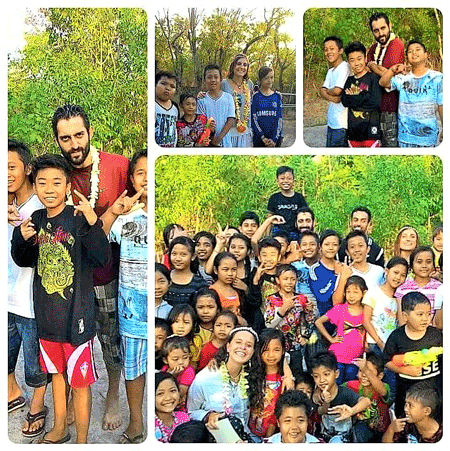 Early Saturday morning, while having breakfast, his sons pulled me aside and gave me a sarong (the Indonesian national dress), helping me wrap it the right way. I knew this wasn’t going to be an ordinary day. But I never expected it to carve itself such a high place in my memories.
Early Saturday morning, while having breakfast, his sons pulled me aside and gave me a sarong (the Indonesian national dress), helping me wrap it the right way. I knew this wasn’t going to be an ordinary day. But I never expected it to carve itself such a high place in my memories.
They were going to a remote community halfway up a mountain – which apparently had no name – where the poorest and most vulnerable lived. The natives who lived there were on the opposite side of youth, so every month, Putukawi and a group would travel up to hand out essentials like water, rice, oil, clothes and whatever else they could raise. This commune didn’t have roads, electricity or running water, let alone schools and pharmacies. This was the jungle. We had to leave our bikes and cars and trek through kilometres of thick bushes and trees and plants with thorns we could never see, but always feel.
The only question on my mind was, ‘Why didn’t you tell me?’ Had I known we would be trekking, I would have worn normal shoes, not slippers. My internal moaning ended abruptly when I noticed this was not a community which had built its homes with any sequence or pattern. It felt like they had been walking far too long, got exhausted and built their homes where they stopped in the moment.
These ‘houses’ were, in fact, unfinished structures. The most opulent of them all were unpaved breezeblocks. No plastering, no paint. There were openings for the windows and doors, built out of optimism, but were nothing more than rectangular and square holes for the time being.
The insides were bare, with no more than mats splayed across the floor for beds and barely any other possessions to note. The ‘poorer’ ones had to get a lot more creative.
Like the woman who made herself a shelter using a four-wheeled cart, the ones which fruit sellers use, with a lot of leaves and branches to make an ‘all-organic, environmentally friendly’ roof held up by four posts.
That was where she lived… I stared at it for the longest time. I asked for confirmation, more than once, that this was what she called her home. No where else. She didn’t go away for the weekend to stay with her children or anything, this was it.
Still, she smiled, appreciative for whatever they gave her. She was so happy that we had come with the rest of them and made a joke in Bahasa which they translated to; ‘I would offer you a seat but…’ as she turned and pointed to the cart and laughed. I laughed back, but I saw nothing funny about the fact that she lived there, was thanking me and could make jokes about it.
The genuine happiness of seeing us – in particular Imran and I – and the thankfulness when receiving the ‘donations’ was consistent in every single person or family we visited. They all insisted on us entering their homes, and would then embarrass us by apologising for not having anything to offer us. The ones who did have something to offer embarrassed us even more because they would not stop until we accepted their food and drinks… I would take in the sights of emptiness and then be met by smiles and warmth. Two complete opposites for your mind to digest.
I compare that to my brief time in Jakarta. The capital of Indonesia. A city of over 10 million people. A city in overdrive at all times of the day. Where stress levels and expenses are high and patience and salaries are low. The very first interaction I had with a local was the taxi driver who drove me from the airport to my hotel, naming a price double to that which we had first agreed upon. Once he realised he wasn’t going to get anywhere he gave me a few choice words in Bahasa instead…welcome to Jakarta, I suppose.
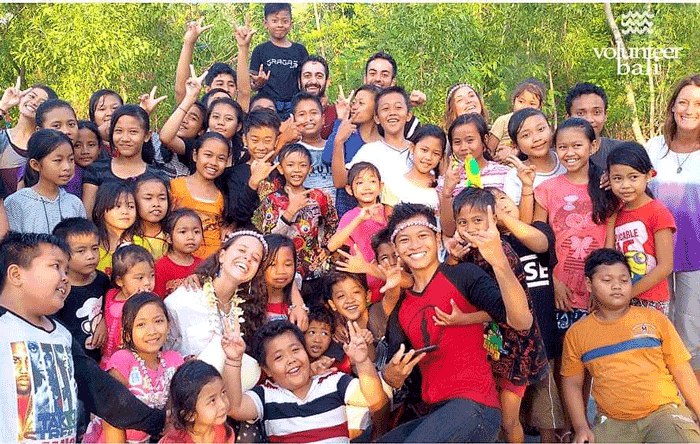
The very next taxi driver for my next journey delved into his vocabulary to find the words ‘f*ck’ and ‘off’ before speeding away, because I refused to pay him four times the amount the receptionist had told me the commute would cost. This was a city, like most major capital cities around the world, where if you don’t have your wits about you, you’ll be taken for a ride.
Tiyanar on the other hand, showed us nothing but hospitality and respect. The apprehension which comes with being in a new country and culture, with a massive language barrier, was most definitely present in Jakarta, but evaporated within days of being in Tiyanar. Within Bali, in Denpasar (their biggest city) and Kuta – a party town, popular amongst tourists – the difference was noticeable. No one swore or was rude like in Jakarta. The locals, however, did see us less as people and more as walking money signs.
A part of me understood it. The locals set traps for tourists, because tourists tend to have a lot more money than them. What I didn’t understand was how the locals of Jakarta, Denpasar and Kuta had much more money than those of Tiyanar, yet the most impoverished of the lot had the biggest hearts, despite the pitfalls of living in poverty, and retained the resilience of character that comes with it.
Though there were strong silver linings in each one of those jungle homes, not all of them came with a shot of positivity.
I remember a middle-aged Balinese man brought us in to meet his mother. She must have been in her late 80’s, and had caught a flu some months earlier, which she still had not recovered from.
Because of her age, and an inability to take her to the doctors, her health deteriorated over time. It was a small hut made of bamboo and teak wood. As soon as you walked in, she was laying on a bed frame on the right with no mattress.
She was thin, frail with marble-like eyes opened as wide as they could possibly be, staring straight up. The son had to call out to her multiple times before he got her attention. She slowly shifted her gaze towards him and as he spoke about their life, I got a strong, overwhelming feeling that she wasn’t going to be around for long. It wasn’t just her circumstances, but the way she was.
All that moved were her eyes as they just about acknowledged those present. Her son brought me forward to introduce me, explaining where I was from, and what I was doing there. She made eye contact and held it. Her pupils were thunder grey but her eyes were shining. It was eerie. It seemed she was looking straight through me. That woman was knocking on death’s door. I was sure of it. I turned around and walked out.
The whole experience was surreal. Highs and lows all mixed into one. We went on to approach a flat plain, where there were four or five structures built in close proximity to each other. A dozen children ranging from ages three to ten came running out to see all the people who had turned up out of nowhere.
The longer we stayed, the closer they inched towards me. All of them were cousins, full of curiosity and mischief. One of them finally made a comment in Bahasa before they all broke out in giggles. I responded to them by chasing after them and causing mayhem. They all ran in different directions laughing and screaming, even their grandmother stepped out to have a look.
As she walked through her ‘open door’ they swarmed her, running around, as she tried to hug as many of them as she could. I stood watching the scene play out with a backdrop designed perfectly by nature. As I observed, I couldn’t help but think that being blessed with as much as we have and with such privileged lives can be a curse at times.
For whatever little these people had, they were so much more appreciative for it than myself, my family, friends and most everyone I know. I felt shame. But my sorrow for them quickly turned into envy when I saw her look up from her grandkids and produce a smile so genuine, so content and full of happiness. To this day, I consider her to be the richest person I’ve ever met.
H. Aga is a traveller and a writer based in the UK. He has worked as a chef, refugee youth mentor and a teacher.



